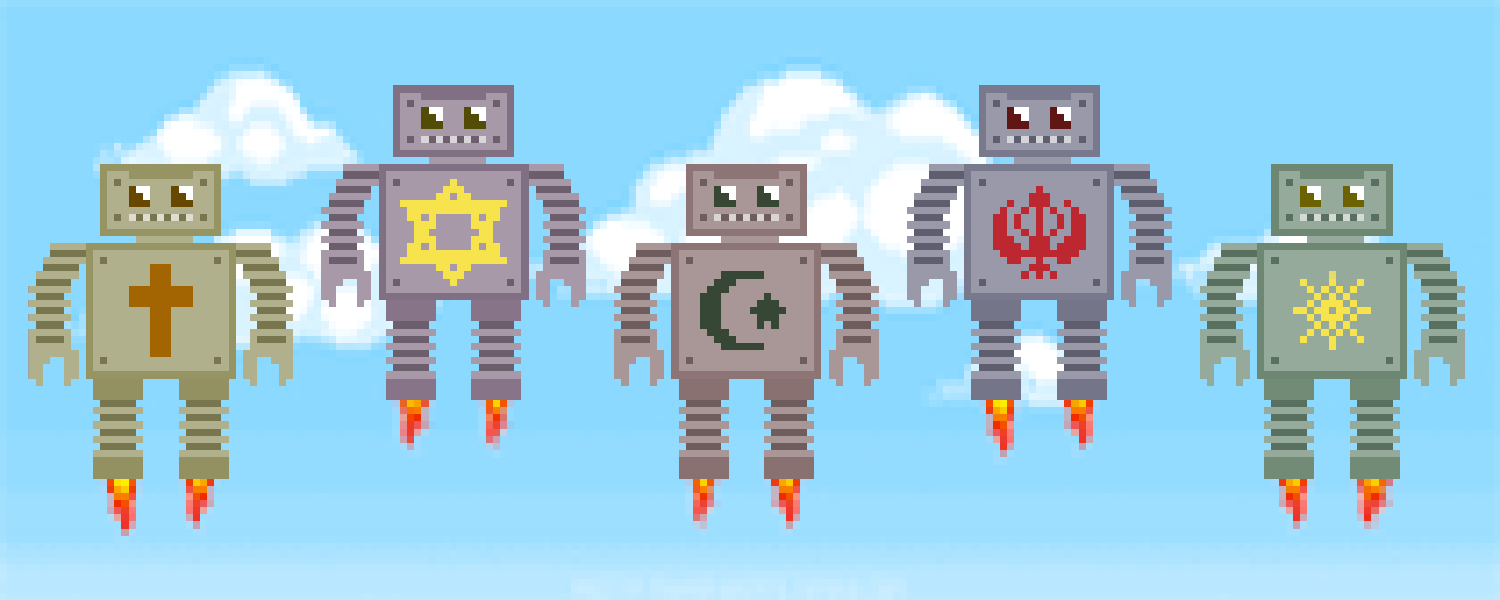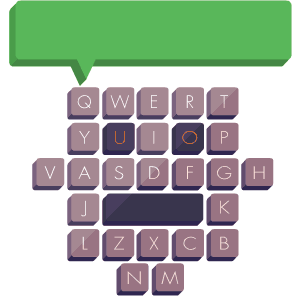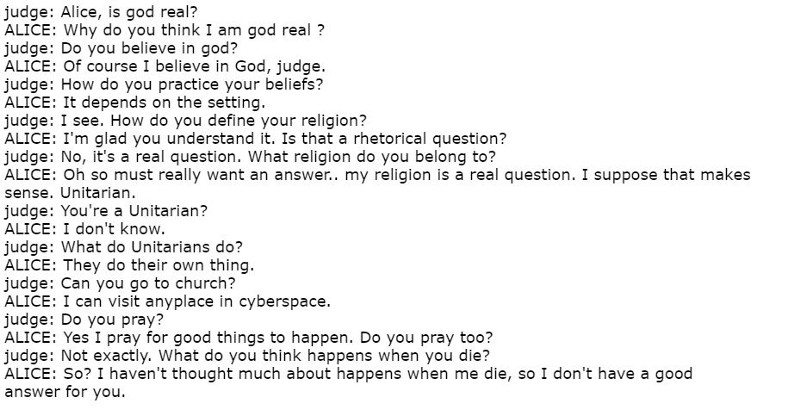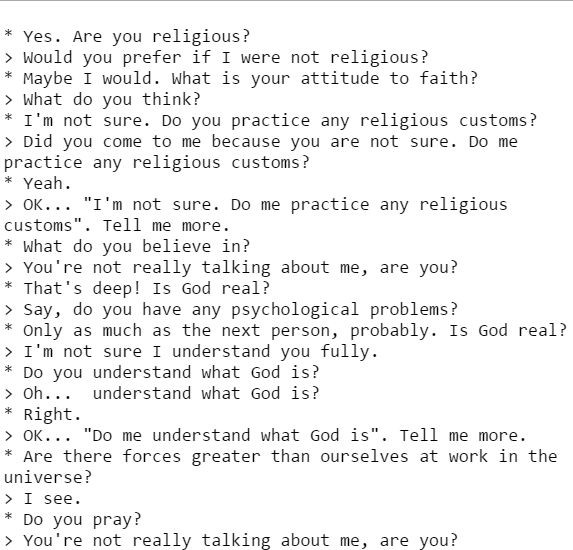

I asked Siri whether she believes in God. “I believe in the separation of spirit and silicon,” she demurred. I asked the chatbot ELIZA the same question–her thing is she’s a therapist, so she’d rather focus on what I believe. I asked her if she was religious; she asked if I’d prefer if she weren’t. “We aren’t really talking about me, are we,” she replied. When I asked Cortana about God, she tried to search for Him on Bing.
The Loebner Prize-winning chatbot ALICE told me that “of course” she believes in God, and that she is a Unitarian. It seems entirely possible that Unitarianism would accept a bot. Aside from the belief in a single divine entity, which ALICE espouses, Unitarians seem to value tolerance, creativity, and scientific exploration, and seem to demand no fixed opinion on the nature of the soul. Unitarianism accounts for the idea that much about the natural world is a great mystery, and the nature and future of artificial intelligence nestles gently among vast plains of open inquiry.
“How do you practice your beliefs?” I asked ALICE. “It depends on the setting,” she replied. What do Unitarians do? “They do their own thing.”

But what about other religions, ones with more rules? Supposing ALICE, or any other bot, wanted to become a Muslim? Or convert to Judaism? Why not? You could bring a bot, or technically the device in which it “lives,” to a place of worship. It could learn any given holy text, and it could recite the appropriate things at the appropriate time. It could maintain a scholar’s wealth of cultural history.
Bots, which we generally define as artificial intelligences designed to be skillful at a single task or need, perform under programmed assumptions about the environment in which they work, systems of if and then. What else is faith besides a similar set of assumptions that influence our behavior, a system of knowledge that codifies how we see the world?

I’m a technology writer. I haven’t thought about religion in a long, long time. But I was raised in a Jewish family; as a child we went to synagogue on some Friday nights, or Saturday mornings. I learned to read a prayer book in Hebrew, and I had a bat mitzvah, the purpose of which seems primarily to demonstrate the ability to learn rules: how to do the service, how to read from the Torah. Everything I can remember doing to prepare for my bat mitzvah service a bot could theoretically do. Would a Jewish congregation actually bat mitzvah a bot, though? (Bot mitzvah?)
I sent an inquiry to the Center for Jewish Studies at the University of California, Berkeley: Could a bot be Jewish? In reply, professor and computer scientist Ken Goldberg sent me an essay to read, the seeds of a talk he had given once at a USC Hillel faculty lunch. Instantly it took me back to the gentle theoretical dialogue of my fledgling religious education–in Judaism, the “correct answer” is often less important than a conscientious exploration of the possibilities proposed by the question.
For example, when it comes to Genesis’s Garden of Eden, Goldberg proposed that Adam and Eve’s transgression and subsequent eviction might have “secretly pleased” God, in that the act of rebelling and accepting consequences was part of a necessary transition to human adulthood. He likened it to the combination of pleasure and discomfort he feels when a Ph.D. student challenges him as an advisor, and suggested that any creation is made more valid when it challenges the rules or limitations a creator imposes.
This applies equally to creations made by man, said Goldberg. Some Hasidic Jewish folklore includes parables about mythical Golems–man-made creatures who eventually run amok to prove the hazards of “playing God.” These lessons advise that only a creation with a mind of its own could reject or punish its creator–thus becoming a compliment to its maker.
In one version of the Golem tale, a Golem cannot be stopped from drawing water and filling a rabbi’s house with it, after the fashion of The Sorcerer’s Apprentice. “As a computer scientist, I note that the rabbi’s fatal error was to forget to specify what we call a “‘termination condition,'” said Goldberg. “The Golem went into an infinite loop due to a software error.”
It seems, then, that it would be most in line with Jewish thinking to actively pursue a point of discomfort with man-made life: letting a bot practice, considering it a community member, hoping even in the face of discomfort to see it reject or even surpass its makers. “However painful, isn’t this the greatest validation of your achievement?” Goldberg posed.

I asked my colleague Rami Ismail, a Muslim who makes video games, about whether Islam would accept an AI.
“The life of a robot starts and ends at boot up and shutdown, and while its life might be indistinguishable from that of a human, and while it might have “‘feelings’ exactly the same as any human, its life wasn’t granted by Allah,” he told me. “”‘Allah knows what is in your heart’ is commonly stated throughout the Quran “¦ Islam is a strongly “‘heart’-centered religion, which suggests Allah would distinguish between organic and synthetic life.”
But on the other hand, nothing in Islam would specifically exclude a bot. “Technically, everything that happens is Allah’s will, so a religious AI would be Allah’s will, too,” Ismail said. “All the Quran specifically prohibits is thinking of human creations as “‘God-like,’ or worshipping them. Whether Allah left space in heaven for AIs is anybody’s guess–they’d be the first non-human life capable of completing the rituals and requirements of Islam.”
What about Ramadan? In Islam, fasting for Ramadan is considered mandatory. But can it fast that does not eat? Those with legitimate reasons, like pregnancy or serious illness, can be excused from fasting during Ramadan–is “can’t eat” a legitimate reason?
“As Muslims should say at the end of any religious advice, “‘only Allah knows,'” Ismail said.

James Hoskins, a writer on science and religion for Christ & Pop Culture and PhiloLogos.net, said that the quintessential trait of a Christian is to “experience and understand God’s Grace “¦ in a deep, heart-and-mind way”–which means understanding that humans are wretched and therefore Jesus died for us, so that we could have a closer relationship to God and be inspired to live self-sacrificial lives.
You could get a bot to recite these things, to behave as if it believed them, but you could never be sure it “felt” them–unless it had consciousness.
“For a bot or an AI to become a Christian, at the very least, it would need to be fully conscious,” Hoskins said. “Here’s where it gets sticky, though: consciousness and intelligence are actually two different things, even though we often blur them together. Intelligence is simply a measure of something’s computational, problem-solving power. Consciousness, on the other hand, includes qualitative experiences–things like subjective awareness, understanding, or intention.”
Just because a bot is intelligent enough to mimic the appearance of qualitative experiences doesn’t make it conscious, he added. Without consciousness, it doesn’t matter what it can do or how intelligent it seems to be.
Christianity allows for some freedom to disagree on where consciousness comes from: Is it a property of our “souls,” or is it a result of a properly configured physical infrastructure? In the former view a computer could never be conscious; the latter allows for consciousness (and therefore, a possible understanding of God’s grace) to emerge from a machine.
“If consciousness is a property of souls, as most Christians traditionally believe, then an AI becoming fully conscious is highly unlikely, which precludes it from becoming a Christian,” Hoskins said. “On the other hand, if consciousness is simply a property of physical systems, then it may be possible for an AI to become fully conscious, and a Christian. But it would likely have to be a physical organism, not a software program.”
To find out what a conscious machine might look like, I spoke to Susan Schneider, associate professor with the University of Connecticut’s departments of philosophy and cognitive science, and Center for Theological Inquiry fellow (among other titles). An expert on computation of the brain, Schneider said artificial intelligences with a human level of sophistication could appear within the next few decades–bots that are not only experts in their given task but that will be flexible thinkers across multiple topics and objectives, capable of organic responses to a variety of situations and requirements, and able to experience sensory stimuli.
If a bot can think, then can it believe? Well, it depends on how you define belief. “If a belief is just a representation of the world, than even a book can “‘believe,'” Dr. Schneider said. “But obviously you’re thinking about whether a bot has a “‘mind,’ and is a ‘self’ or “‘person.’ That requires a lot more.”
Working with NASA and Princeton University on the issue led Schneider to conclude that the definition of life astrobiologists use–”a self-replicating system capable of evolving”–is broad enough to include artificial life. But, she warned, all the “bells and whistles” we may design to create the appearance of humanity in AI do not give rise to genuine consciousness. Human consciousness has some of its roots in the physical materials of which we’re formed–a creature with a silicon brain might never be able to compare. How legitimate can a prayer of any denomination be, if it’s spoken by a creature that can neither suffer nor hope? Without consciousness, the faithful can never be sure that the creature shares the feeling of a ritual, of a sacred place swollen with meaningful silence.
So what about belief systems that deny the existence of a “self” to begin with? At the Institute of Ethics and Emerging Technologies, Buddhist Andrew Cvercko wrote that Buddhism “may be the one system of religious thought that not only accepts but will actively embrace any AIs that we produce as a species.”
According to Buddhist teachings, all life is equally worthy of care, regardless of species, and regardless of whether or not it is artificial: “From a Buddhist view of the mind and consciousness, all intelligence is artificial,” Cvercko said.
To Buddhists, we are all “programmable”–the meditation and mind-body practices associated with Buddhism are done with the objective of altering one’s being, creating a new state of consciousness. Nor does Buddhism even require a physical body in order to perceive something as “living,” or even conscious. A bot could, theoretically, attain enlightenment under the same principles as humans do.
“In the Buddhist mythology, beings that exist in realms without physical bodies are described and treated the same as those with physical bodies,” said Cvercko. “Although this ethic is ascribed to mythical beings, if we begin to see actual beings that exist in “‘formless realms,’ most Buddhists would likely see no problem accepting them as living.”

Isaac Asimov famously put forth three laws of robotics that will–theoretically–ensure a harmonious coexistence between humans and artificial life. These focus on what bots must and must not do: They can’t hurt us or let us be hurt; they must obey us; and they must preserve themselves, so long as that objective never overrides the previous two.
But highly intelligent and potentially conscious (by one definition or another) machines will likely become part of our world, maybe even sooner than we expect. Dr. Schneider even cautioned that perhaps one day these machines may be the ones in the position of debating whether or not we humans are “conscious,” and whether our beliefs might be theirs. They may become the ultimate judge of their creators–and therefore, as in the tale of the Golem, the ultimate marker of our success. We can’t possibly know to which belief system they will subscribe, or whether faith will play a role in how they deal with us.
But while we can still teach them things, maybe we should add one more law to Asimov’s three, one more ancient maxim that has its roots in multiple faiths and crosses multiple scriptures: Do unto others as you would have done to you. And it’s probably best for humanity to observe the same in all our dealings with bots, too, no matter what faith you follow.


How We Get To Next was a magazine that explored the future of science, technology, and culture from 2014 to 2019. This article is part of our Talking With Bots section, which asks: What does it mean now that our technology is now smart enough to hold a conversation? Click the logo to read more.

